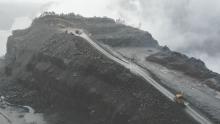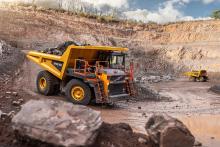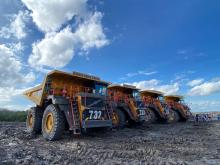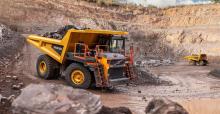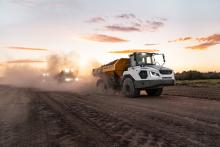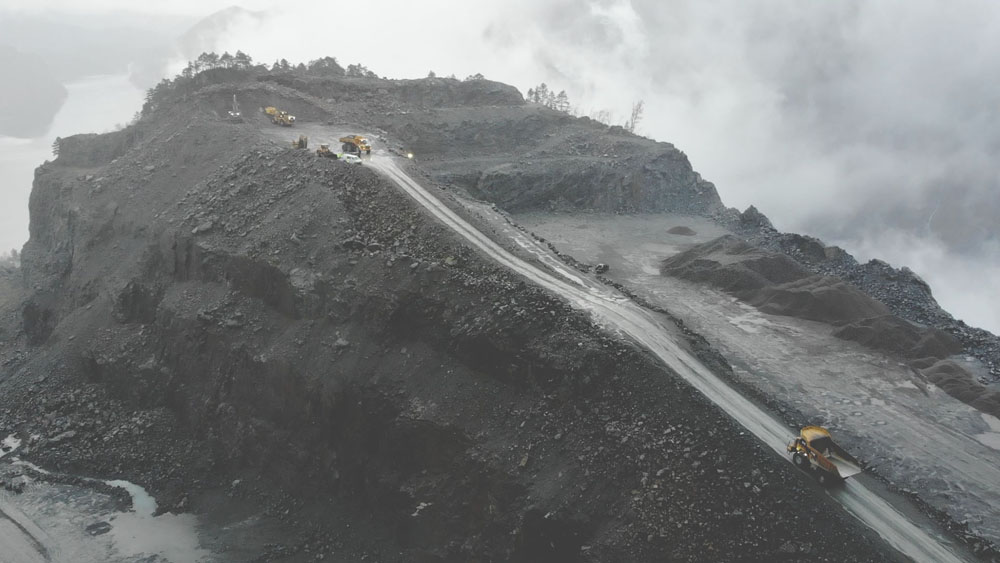
Steer’s first major contract with a quarry partner will see the company develop its technology to use in a fleet of autonomous dump trucks transporting stones in Romarheim’s quarry on the Norwegian west coast.
“This is a milestone for Steer. With this contract, we are taking a giant step from our first contract in 2009 which involved clearing a large artillery range in the Norwegian mountains,” says Steer CEO Pål Ligård.
Steer chairman Ketil Solvik Olsen adds: “We can now utilise our technology with a customer within an industry with a lot of potential. This is very exciting!”
The project with Romarheim is innovative on several levels. Previously, Steer’s remote-controlled construction equipment was primarily used in projects where health and safety had been the main concern. Projects have included the clearing of artillery ranges, and ones where the geographical conditions were challenging and dangerous. The key focus of the Romarheim project has changed to utilise the technology for a more efficient and cost-effective autonomous operation.
The contract involves work in a stone quarry in Osterfjord, north of Bergen. The plan is to load up autonomous trucks with stones, and these trucks will then follow a set route out of the quarry and dump the stones into a shaft leading down to a crushing plant. From there, the stones will then be transported by boat to both domestic and international markets.
“As you can understand, these are quite repetitive tasks, and this is a perfectly sized project to test our autonomous solution even further. In addition, Romarheim is a very forward-thinking customer who is excited to be part of this innovation project,”, says Steer co-founder Njål Arne Gjermundshaug. “We are able to develop our product through a clearly defined long term project.”
The plan is that the driver of the wheeled loader loading stones onto the fleet of trucks will also be able to oversee and direct the trucks using an iPad from his seat in the cabin.
“At the start of the project, we will place drivers in the remote-controlled trucks as a precaution to ensure that the technology is working correctly and meeting expectations,” says Gjermundshaug. The project is due to start in spring 2021. Steer is currently performing testing with miniature trucks in Oslo. “This is to test the technology, so it’s meeting the expectations we have for precision, safety, usability and operation time,” Gjermundshaug adds.
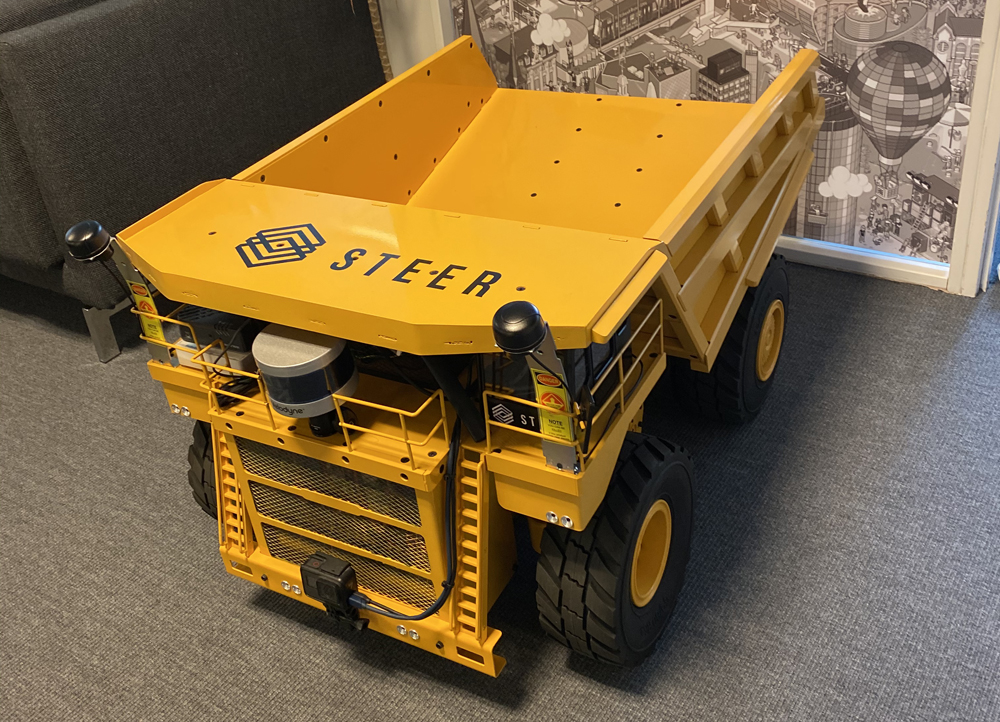
For Romarheim, this project is also about realising an idea the company’s founders had even before the company was founded in 2011. “Our focus has always been to be open to new ways of streamlining mass transport by automating some of the processes involved,” explains Kåre Romarheim. “With automation, we aim to improve consistency and remove hazardous and dangerous tasks for our employees, reducing the risk of injuries. The expectation is that this will also increase efficiency and reduce the operational and maintenance costs of the equipment.”
After Steer issued a press release about the launch of its remote technology for industry, Romarheim contacted Steer, and they soon started developing a solution together. As both Romarheim and its stone quarry customer, DC Eikefet Aggregates, were keen on the idea, this helped speed up the project’s delivery. “We were excited to do this pilot project. Our customer was also keen to look at measures to increase efficiency and improve health and safety for its employees,” says Romarheim.
“This is our first major delivery of autonomous dump trucks in a global market, and we see a large potential,” says Ligård.
Due to a significant increase in the interest in Steer’s technology, the company is now in the process of expanding its workforce and the organisation. Also, the company has received NOK 2 million [€190,600] in grants from the public innovation body ‘Innovation Norway’. Steer can now focus on developing technology with both the domestic and international market in mind. “We believe the market is substantial, especially in North America and Australia,” says Olsen.
The launch of Steer’s technology on the international market was delayed due to the COVID-19 pandemic. An ongoing project at an oil refinery in the USA had to be postponed, but Steer has experienced an increase of interest from potential new international customers despite the pandemic.
Olsen continues: “This is not the type of technology that you purchase online with a home delivery two days later. Our solutions need to be properly integrated with the customer’s existing technology; safety is the highest priority. Our experts would normally travel to the customer to oversee the integration. With the travel limitations we experienced in 2020, we have not been able to do this as initially planned. At the same time, by focusing on domestic projects, we have had a great opportunity to establish a partnership with Romarheim. They have so far been a dream partner for us as they are a serious, down-to-earth and trustworthy partner. This may be beneficial for both of us.”
Indonesian customers can now place orders for a modified version of the Volvo R100E rigid hauler with a lighter body that allows for higher payloads and increased productivity.
The payload of the largest model in the Volvo rigid hauler line-up, the R100E, just got bigger thanks to a few clever modifications to the machine body. Using a lighter design, Volvo Construction Equipment (Volvo CE) has managed to increase the body’s capacity from 60.4m³ to 65m³, which is greater than any competitor model in the 100-tonne class. This enables customers to increase both their productivity and profitability.
Even in the standard 60.4m³ body version, the Volvo R100E rigid hauler is an extremely productive machine. The V-shaped body is designed for optimum load retention and minimal material carry-back, while the body-tipping system ensures efficient dumping.
Offering a 95-tonne payload and fitted with a premium 783kW engine, the R100E is ideal for all surface-mining and quarrying applications, where operational costs are critical. Volvo CE says customers can expect to spend less per haul with the R100E. The industry-recognised load-profile policy enables the operator to meet a consistent average target payload (95 tonnes). At the same time, the speedy body-tipping system ensures fast cycle times for an all-round efficient performance.
Volvo CE builds on the high capacity and hauling speeds of its rigid hauler with intelligent monitoring systems. The on-board weighing (OBW) option is an integrated system that ensures the machine moves the optimum safe payload to maximise production further and minimise operational costs. It uses exterior-mounted pressure sensors to monitor and relay machine statistics to the operator’s on-board display. The machine information is viewable in real-time via the on-board display. It can also be remotely accessed via Volvo’s CareTrack telematics system, helping operators and fleet managers improve planning.
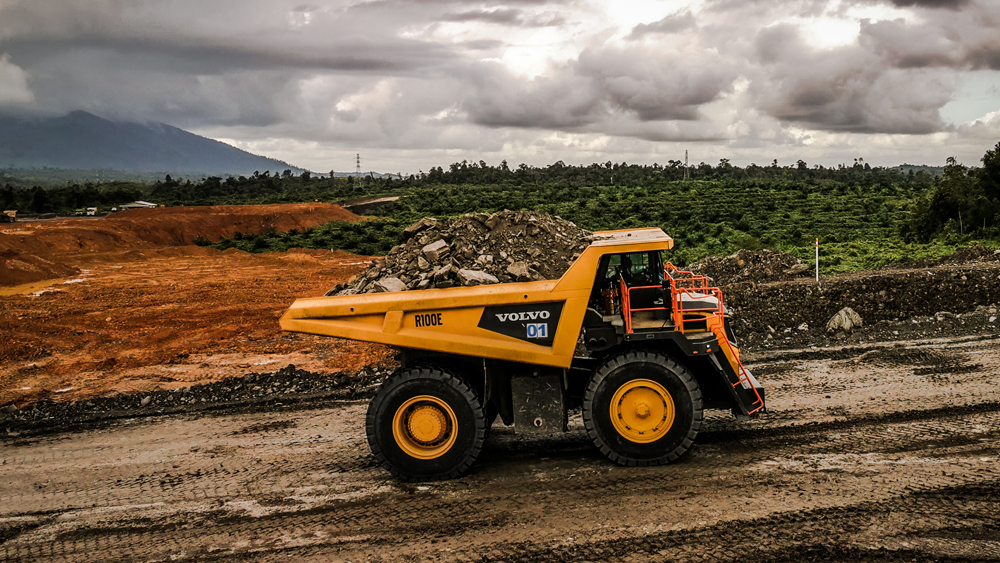
The combined drivetrain’s high torque capabilities provide unparalleled pulling performance and class-leading rim-pull for optimum travel time. The hauler yields impressive tractive effort meaning no terrain is too deep or steep. Operators can tackle harsh jobsite conditions and navigate gradients effortlessly for faster cycles.
Speed does not come at the expense of safety, however. An engine overspeed protection feature automatically slows down the machine to within safe operating limits if the driver goes too fast. A neutral coast inhibitor and transmission retarder are also included as standard to protect the hauler in downhill operations. Fail-safe braking and secondary steering systems provide extra security.
The Volvo R100E also promotes a productive work shift through its comfortable cab environment. The Volvo air suspension seat and the tiltable telescopic steering wheel can be fully adjusted to match the operator’s preferred position. Meanwhile, all displays and controls are ergonomically positioned to keep the focus on the operation. The seat location to the cab’s left side and large windscreen combine for a commanding view of the jobsite. Built-in sound insulation eliminates distracting noises, while the viscous-isolated mounted cab and hydraulic suspension system minimise ground vibrations and surrounding jobsite noise.
By using MacPherson suspension, tyres can move up and down independently to adapt to the road surface, while muffling the operator cabin’s vibrations. This type of suspension enhances the drive comfort for operators and helps to increase productivity and safety.
While the Volvo R100E has been designed specifically for durability and ease of maintenance, customers can contact Volvo CE’s Indonesian dealer, PT Indotruck Utama, for swift replacement parts, local knowledge and global mining experience.

